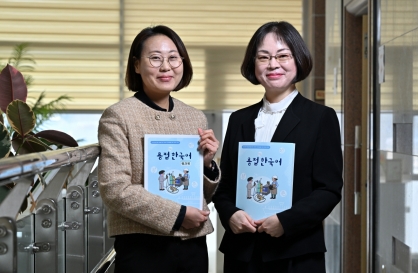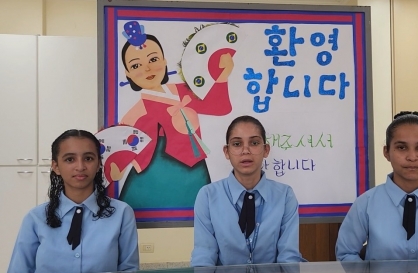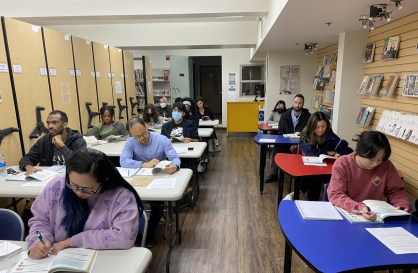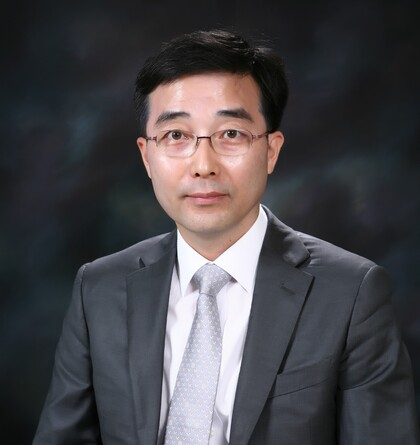Most Popular
Hello Hangeul
-
1
Welding book first in vocational Korean series for foreign labor

-
2
[Korea Beyond Korea] In Sao Paulo, horizons expand for Korean studies
![[Korea Beyond Korea] In Sao Paulo, horizons expand for Korean studies](//res.heraldm.com/phpwas/restmb_idxmake.php?idx=644&simg=/content/image/2023/11/20/20231120000619_0.jpg&u=20231206104853)
-
3
In Brasilia, worldly dreams are born from Korean classes

-
4
Americans seeking to visit Korea learn the language in LA

-
5
[Korea Beyond Korea] Berlin, Europe's Korean Studies hub, nurtures next-gen experts, scholars
![[Korea Beyond Korea] Berlin, Europe's Korean Studies hub, nurtures next-gen experts, scholars](//res.heraldm.com/phpwas/restmb_idxmake.php?idx=644&simg=/content/image/2023/10/18/20231018000929_0.jpg&u=20231023154735)
[Hello Hangeul] 'Teacher shortage most pressing issue for continued Korean boom'
Seoul National Univ. professor Lee Ho-young says AI, metaverse will revolutionize Korean learning in longer term
By Choi Jae-heePublished : Aug. 19, 2023 - 16:01

Lee Ho-young, a linguistics professor at Seoul National University, says the most pressing issue in the field of Korean language education overseas is the shortage of teaching staff.
In an email interview with The Korea Herald, he pointed to the ongoing government-funded projects to cultivate domestically trained lecturers of Korean language, although he said their effectiveness remained to be seen.
He echoed many lecturers and scholars who have shared with the Herald earlier that from Latin American countries to Asian neighbors, the demand for Korean language education, largely fueled by the popularity of Korean pop culture, has breached a threshold that can be addressed through teachers dispatched from Seoul.
Taking a broader perspective beyond current challenges, however, Lee suggested that the future of Korean language education might be characterized by a greater freedom from physical limitations, thanks to the advancement of technology.
The former chief of the SNU’s Language Education Institute from 2019-2021 and the language research center under the Artificial Intelligence Institute from 2020-2022 pinned high hopes on the integration of AI and metaverse to bring in key changes in Korean language class worldwide.
Below are edited excerpts from the interview.
Q. What do you think are the most important tasks in Korean language education around the world?
I think more focus should be placed on fostering the pool of local teachers. The National Institute of Korean Language said they will develop a program for this, and provide it for free. We’ll have to see how effective it is, and make improvements should there be any insufficiencies.
Q. Hallyu is undoubtedly among the main factors that drove the rapid increase in demand for learning Korean. What should the Korean government, universities or related institutions work on to keep the Korean language in demand, without the help of Hallyu?
I think the economy has to be the next important factor. Because Korea is a manufacturing powerhouse, many jobs have been created (by Korean manufacturers) for foreigners both in and outside Korea. Without the backing of a strong economy, I think the Korean Wave can’t last.
Q. As language and culture are intertwined, Korean cultural education is considered essential in Korean language education. Could you share your views on the role of Korean cultural education and how it should be done?
South Korea resorts to rather formulaic methods in teaching Korean history and culture to non-native speakers. For example, it simply feeds them facts on how Korea went from a poor country to an advanced one. It would be more effective to let (students of the Korean language) see present-day Korea with their own eyes.
Instead of trying to implant certain facts and ideas, we should focus more on allowing (the students) to actually experience Korean culture. Foreigners who have tried good Korean food, for instance, voluntarily upload photos and videos of it online.
Q. How do you think the edu tech industry can help the qualitative growth of Korean language education around the world?
I expect that Korean language education will take place within the metaverse using AI technology in the future. I believe that by effectively harnessing the AI technology that has already been developed, it is possible to create highly effective Korean language education programs.
The following series is part of The Korea Herald’s “Hello Hangeul” project which consists of interviews, in-depth analyses, videos and various other forms of content that shed light on the stories of people who are learning the Korean language and the correlation between Korea’s soft power and the rise of its language within the league of world languages. – Ed.













![[Korea Beyond Korea] In Sao Paulo, horizons expand for Korean studies](http://res.heraldm.com/phpwas/restmb_idxmake.php?idx=644&simg=/content/image/2023/11/20/20231120000619_0.jpg&u=20231206104853)


![[Korea Beyond Korea] Berlin, Europe's Korean Studies hub, nurtures next-gen experts, scholars](http://res.heraldm.com/phpwas/restmb_idxmake.php?idx=644&simg=/content/image/2023/10/18/20231018000929_0.jpg&u=20231023154735)







![[Today’s K-pop] Treasure to publish magazine for debut anniversary](http://res.heraldm.com/phpwas/restmb_idxmake.php?idx=642&simg=/content/image/2024/07/26/20240726050551_0.jpg&u=)